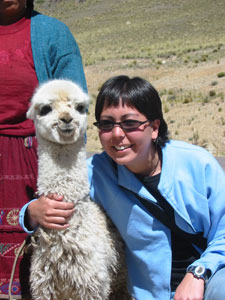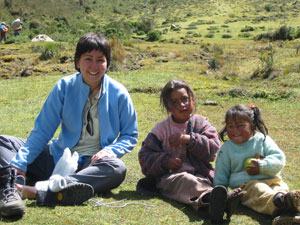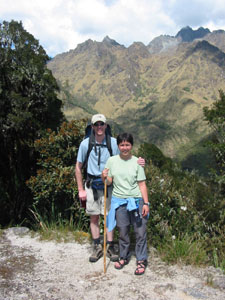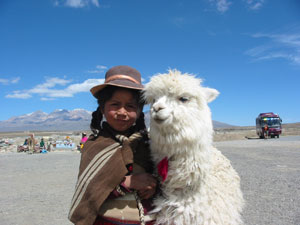|
September 7, 2005
Living, working and volunteering abroad:
Danielle Lafond remortgages her condo to set up a non-profit community
development project in Peru
Some time in July I was watching our local TV station, CityTV,
and I caught a part of a report about a Toronto couple that had
remortgaged their home to start a non-profit community development
organization in a small town on the Pacific Coast in Peru. I didn't
catch their name or their contact information, only the website:
www.paraelmundo.org. I
used the contact email on the website to try to locate this couple
and to ask them for an interview.
I got a response back and met Danielle Lafond, the female member
of the couple and co-creator of the project, in a restaurant in
Toronto's Greektown and was struck by her youthful energy, idealism
and commitment to improving this world. The decision to put their
own finances at risk and invest at least a year of their lives in
this Peruvian community had a strong impact on me and I am delighted
to be able to introduce to you this delightful young woman: Danielle
Lafond.
1. Please tell us about yourself. Where are you from, what
is your educational background?
I am in my mid twenties, and I just completed a 4 year social work
degree at Ryerson University. Before that, I studied music and also
worked and traveled for several years as a tour guide in Canada.

Danielle Lafond
2. You have a very strong social conscience. What life
experiences have shaped your belief system?
As a woman of color, I've always been conscious of issues relating
to racism and sexism, but I became more politically active after
moving to Toronto and connecting with others who had similar experiences.
I also had many personal struggles in my teens which influenced
my desire to help others.
3. When you were young you hitch-hiked across Canada. Please
tell us about that trip and what you learned from it.
I left high school to travel when I was 16. My trip took me across
most of the country, and I met many interesting people who were
leading very interesting lives, making their living in non-traditional
ways. It inspired me to follow my dream of making a life, not just
making a living. Also, my faith in humanity, in people, was completely
restored. I met many people from many walks of life, and almost
everyone was willing to share, laugh, talk and open their hearts
and homes to me. The
experience left me with a sense that all people share an essential
goodness.
4. Some time ago you also went to Cuba and taught ESL classes
in exchange for room and board. Please tell us about that experience.
A few years ago, I went to Cuba with no plans, and very little
understanding of the sociopolitical situation in Cuba. To me, it
was just another island in the Caribbean. I knew I didn't want to
do anything typically tourist-oriented, so I ended up at the University
of Habana in the summer months, where I worked out deal with someone
working there to give me room and meal tickets in exchange for teaching
English a few hours a day. I had $500 dollars in the bank, and a
return ticket, and I
managed to last a few months this way. It was an incredibly humbling
experience, because I saw for the first time how people outside
North America live, and I was able to meet and learn from Cuban
people. I learned a little Spanish, and fell in love with Afro-Cuban
and Latin music. I had been a musician my whole life, but this trip
showed me how music could be used to connect with people across
language
and cultural barriers.

Danielle in Peru
5. Through your studies in social work at Ryerson University
you spent some time in Peru, completing the placement for your degree
requirements. Where did you go and what did you do there? What places
did you travel to in Peru and what did you learn about the culture?
As my third year placement, I decided I wanted another international
travel experience, and made plans to travel with a close friend.
I knew that the experience of doing social work in South America
was going to be challenging and emotionally trying, so I was glad
my friend agreed to do this together. We spent the first part of
our time in Peru travelling, along with my partner Josh. The three
of us were amazed by the diversity of the country.
We started in Lima, a city of over 11 million people, with distinct
neighbourhoods and cultural practices, then traveled to Arequipa
and Cusco, Macchu Picchu, Puno, and Lake Titicaca, which each had
completely different cultural groups, languages and food. Many of
the people we met were Indigenous Peruvians who spoke various dialects
of Quechua. Many of them spoke no Spanish at all. The more we traveled,
the more I felt in awe of the strength, resilience and resourcefulness
of the
people we met, who had been struggling for many hundreds of years,
but who are also rich in cultural traditions, food, music, art,
history and languages.
6. This time in South America convinced you to stay involved
on a more lasting level with the people of Peru. In particular you
wanted to do something for a fishing town called Mancora. Please
tell us how you got the idea to create a non-profit international
development organization.
After our travels, my friend and I ended up in a small fishing
community in Northern Peru, 19 hours north of Lima by bus, and about
an hour south of the border to Ecuador. Again, we were completely
surprised to see another part of Peru so different from all we'd
seen thus far. Mancora is in a desert climate, so it is very dry
and sunny, and the town has little infrastructure. Many people don't
have running water, and most who do only have it a few hours every
other day or so. The power cuts out unexpectedly, and safe clean
drinking water is not readily available or affordable. Also, there
were no social services and very limited access to health care,
unless one could afford to pay for it.

Josh and Danielle in Peru
The town's dependance on a once-booming fishing industry is rapidly
changing to a dependance on tourism. A big El Nino in 1989 caused
much grief for the town, which was isolated for 15 days, but it
also created a beautiful beach which is now popular with surfers
year-round.
As social work students, we were mostly working with women in the
community, and we met an amazing couple who had started a small
NGO (Non-governmental Organization, or not-for-profit organization)
to try and help the people in the community in various ways. My
friend and I spent the rest of our time in Peru living and working
with them, working and researching what the most pressing needs
in the community were. What we discovered from interviewing Mancorians
was that
the people in town were concerned about the lack of affordable/accessible
health care, unemployment, alcohol and drug addiction and domestic
violence.
When I returned from my trip, I began discussions with my partner
Josh, a Toronto Paramedic, and with a few close friends about starting
a not-for-profit organization in Canada to help this under-serviced
community in Peru. The most important thing for me was to be able
to provide assistance to the people of Mancora as they saw fit,
and not to impose my own ideals on them. The people we worked with
last year seemed to feel strongly that having accessible medical
care was an urgent need in their community, so this is where we
focused most of our energy and resources for our first year projects.
7. To get this organization off the ground, you and your
husband re-mortgaged your home and you are uprooting yourself from
your familiar environment in Toronto. Why did you decide to undertake
such significant personal and financial sacrifices?
As Canadians, we are so privileged in comparison to the rest of
the world. The more I learn about world history and politics, the
more I realize that our privilege, and the richness of the Northern
hemisphere in comparison to the South, is a direct result of centuries
of the South being continually robbed of their resources. For example,
in Peru, we visited countless numbers of sites that had once
been laden in gold and silver, which was stolen and used to build
up the wealth of European nations.
Although I recognize that there is also an unequal distribution
of wealth and resources in Canada, I felt that I wanted to use what
privilege I had to benefit this particular community. My husband
and I took out a mortgage to finance the first year of this project,
and to pay the legal fees associated with starting up an NGO in
Canada. Our organization is called PaM, or Para El Mundo (For the
World), and
you can get more information on our projects at www.paraelmundo.org.

8. Your organization has already completed its first mission:
the shipment of a container of medical supplies to the town of Mancora.
Please tell us about how you accomplished this mission.
There is currently a container full of medical equipment and supplies
sitting in Lima, and we are in the process of working out how to
get it here to Mancora. Josh and I financed the cost of the international
shipping ourselves, and we are working with the Red Cross in Peru
to set up a medical centre here in Mancora. The actual equipment
in the container came from donations from various hospitals in Ontario,
and we also had an enormous amount of help from DMGF Canada, an
organization run by a Toronto EMS colleague who does disaster relief
missions. On the day the container was loaded and shipped from Toronto,
a number of Toronto EMS staff, firefighters from Toronto Pearson
Airport, and friends of ours involved with PaM came to help load
the container.
9. What other community development initiatives are you
planning for Para El Mundo and the town of Mancora? What are your
long-term goals?
For the mist current information on our ongoing and long-term projects,
please visit our website www.paraelmundo.org.
10. What are the key challenges facing your organization?
To be honest, our key challenge is raising the money to keep our
organization running. We have a number of great volunteers coming
from Canada over the course of the year, and we have many supportive
friends in Mancora helping us with projects. We hope that over the
next year, we can raise enough money to keep the medical centre
open and to continue other projects.
11. Your husband is already in Peru and you will be leaving
shortly. Where are you staying, what are the living circumstances
going to be?
We are all renting a large 4 bedroom house, and there are four
of us living here right now. Josh and I are committed to staying
at least one year, and depending on the financial situation of PaM,
we would like to stay indefinitely. Our two friends from Toronto
who are here with us now may or may not be coming back after Christmas,
and we have 10-12 volunteers coming over the course of the year.
12. Your best friends will be joining you and you plan
to document the evolution of your project. Please tell us more about
that.
Two of our best friends are currently here with us. One is a photojournalist
who has already taken many beautiful shots of community events and
of our work. We all write a lot, so we are thinking about putting
together a collection of photos and journal writings to publish.
I think we may start by putting together a calendar for Christmas
to raise money for PaM, and see how that goes.
Thank you, Danielle, for sharing with us an account of the unique
path you and Josh have taken. I wish you all the best for your efforts
in Mancora and hope you stay in touch and update us as to how things
are going in Peru.
Related Articles:
Here is the preview for Danielle's
interview
Danielle's first
progress report from Mancora after moving to Peru
Mary Jane Mikuriya: Servas
traveller, champion of social justice in San Francisco
Dr. Rajiv Arya: My cool dentist
|